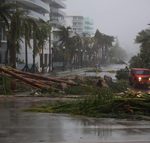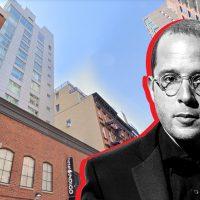Hotel owners nationwide have likely deployed teams of lawyers to scour their insurance policies, hoping to find a clause that covers a portion of the monumental damages inflicted as a result of Covid-19. Most of them have been sorely disappointed.
But a very small number may be holding a trump card. In New York City, Rotem Rosen’s Hotel Indigo Lower East Side appears to be one of the lucky ones, or one of the more strategic.
The boutique hotel is among the very few whose insurance policy covers business losses caused by “diseases and epidemics.” The property — which remains open — is losing money and Rosen’s MRR Development recently landed a $1.7 million small business loan to cover payroll and other expenses. But it could stand to receive a much bigger payout.
Rosen’s firm has “informed the insurance company of its intention to file a claim,” according to a recent public filing. The payout remains uncertain, and Rosen declined to provide specifics about the Hotel Indigo’s policy.
If MRR does get reimbursed for coronavirus-related losses, it would be a rarity in the real estate world. And just as the September 11 terrorist attacks led to major changes in how terrorism risk is insured-against in the U.S., the coronavirus pandemic is set to have long-lasting effects on pandemic insurance. The devastation has led several real estate trade groups to join other business leaders in support of a push to create a federal backstop for pandemic and epidemic insurance claims.
Ever since the SARS epidemic of the early 2000s, insurers have generally excluded virus- and bacteria-related losses from their coverage because it would be too costly — one hotel chain, Mandarin Oriental International, received a $16 million payout after SARS.
In recent years, a handful of providers have attempted to offer insurance specifically to cover risks associated with pandemics, but none has gained widespread acceptance — and some have even failed to pay out now that a pandemic is actually here.
“What we’ve heard from our partners in the insurance industry is that from their perspective, it’s just extremely hard to model pandemic risk, and we certainly understand that,” said Kevin Donnelly, vice president for government affairs at the National Multifamily Housing Council. “And many folks said the same exact thing about modeling terrorism risk after 9/11. ”
Already, a flurry of lawsuits and lobbying initiatives across the country provides a sense of what may be to come.
Read more



Creatively excluded
In early April, Texas-based movie theater and restaurant operator SCGM, Inc. sued its insurer over coronavirus coverage after its venues were forced to close.
The suit was one of many that have been filed across the U.S. in recent weeks, but SCGM’s was special in one particular way. Instead of the general business-interruption insurance that most other plaintiffs claimed, SCGM had actually gone through the trouble of securing a pandemic-specific policy.
SCGM’s pandemic insurance was provided by underwriter PLIS Inc. through the Lloyd’s of London insurance marketplace, and came in the form of a “Pandemic Endorsement” attached to a product known as “Trade Name Restoration,” which primarily covered risks from food-borne illnesses.
“This type of policy will fill in the gaps that others creatively exclude or do not address,” promotional material for the insurance product declares. In addition, it will cover “business interruption along with extra expenses with crisis management that is crucial during pandemic and food borne illness events.”
But once the novel coronavirus arrived on American shores in late January, it turned out that the PLIS policy had gaps and creative exclusions of its own, the lawsuit alleges. After filing a claim in mid-March, SCGM says it received this response: “[Covid-19] is not covered under the Pandemic Event Endorsement as it is not a named disease on that endorsement.”
Of course, Covid-19 could not have been named in the insurance policy, because the disease did not yet exist at the time that the policy was written. SARS, however, is named — and SCGM’s complaint goes to considerable lengths to demonstrate that Covid-19 is a “mutation or variation” of SARS, in order to prove that it should still be covered.
PLIS did not respond to requests for comment.
Do Insurance Yourself
With most insurers reluctant to deal with the risks surrounding pandemic events, some businesses have decided to take on the risks themselves through a structure known as “captive” insurance — in which the entity that is providing the insurance is fully owned by the insured business itself.
Due to the potential for abuse and tax evasion, the Internal Revenue Service began ramping up scrutiny of captive insurance schemes earlier this year, the New York Times reported. But the coronavirus crisis has given the arrangement an opportunity to prove its worth, as a way of insuring against “black swan” events.
A lot of the captive insurance policies are underwritten for events that are “low-frequency, high-severity risks,” Kacie Dillon of law firm Woolston & Tarter told the Times. “It’s not great that we have the coronavirus, but it does show how captives can be a useful tool for business.”
Traditional insurers can also help with the process of setting up a captive policy, through an arrangement known as “fronting.” The insurer will issue a policy, but the captive will take on the risk.
Insurance firm AIG, for example, has provided such services to hotel clients. A presentation from the company’s alternative risk solutions group describes a deal in which the firm provided fronting for a hospitality client. In that case, the client was looking to protect itself from a business interruption loss “arising from a pandemic event” that would “cause potentially significant reduction in revenue if customers avoided the business due to health concerns.”
Already on fire
Silicon Valley, unsurprisingly, has also tried its hand at providing insurance for pandemics. San Francisco-based startup Metabiota, which had worked with the West African government of Sierra Leone to fight ebola in 2015, pivoted to the insurance business in 2018.
The startup teamed up with insurance brokerage Marsh, and German reinsurer Munich RE to launch PathogenRX, “an innovative solution for pandemic and epidemic risks.” The companies envisioned real estate as one of its key markets.
“Shopping malls, entertainment venues, and mixed-use properties rely on consumer confidence and the ability of people to move about without fear for their safety and health,” according to now eerily prescient promotional material.
But not a single company bought this insurance, according to Insurance Journal. Now, Marsh is receiving a barrage of inquiries.
“Unfortunately, it’s too late,” Marsh’s Peter Lacovara told the publication earlier this month. “The coronavirus is excluded from coverage. That would not have been the case as recently as last November. But you can’t buy insurance for your house when it’s already on fire.”
The private sector appears unable to provide affordable pandemic insurance on its own, said NMHC’s Donnelly.
“We do believe the government needs to be there to ease the private sector insurance market into this space, so that the coverage that does exist can be attainable to businesses that ultimately need it,” Donnelly said.
The next big one
While disputes continue to rage over whether pre-existing insurance policies might be required to pay claims on coronavirus-related losses, business groups are also considering how they will be able to protect themselves against similar events in the future.
On April 20, a coalition of business organizations directed an open letter to leaders of Congress, expressing support for the Pandemic Risk Insurance Act of 2020. It would set up a federal “backstop” for pandemic and epidemic insurance claims. The program is modeled after the Terrorism Risk Insurance Act of 2002 which was adopted after the 9/11 attacks.
Several real estate trade organizations are signatories to the letter, including the National Multifamily Housing Council, the American Hotel & Lodging Association, the Building Owners and Managers Association, the International Council of Shopping Centers, and the Retail Industry Leaders Association.
Donnelly added that his organization is also backing another initiative that would establish a Recovery Fund for businesses, modelled after the Victim Compensation Fund established after 9/11.
A backstop is needed urgently, the letter’s authors say: “The vanishingly few businesses who have been able to obtain pandemic coverage endorsements to their policies will not be covered for Covid-19, or any mutation of it, if the virus returns this winter.”
